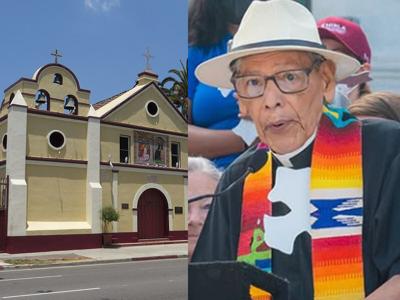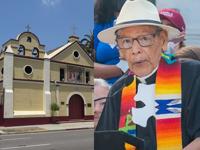
La Iglesia de Nuestra Señora la Reina de Los Ángeles, or The Church of Our Lady the Queen of the Angels and Father Richard Estrada. (Ken Lund/Wikimedia Commons; CHIRLA)
On Monday, March 31st, I received the news that Chicano activist and priest Richard Estrada passed away at age 83 years old.
Last Sunday, when I learned Father Richard Estrada had been hospitalized at the Good Samaritan Hospital in Los Angeles, I felt compelled to visit the Church of the Epiphany in Lincoln Heights. Right after the service, I met with the community, who shared the heartbreaking news of his health condition.
His unwavering dedication to God and the most vulnerable has left an incredible mark on many lives, including mine. From his work in the Chicano and farmworker movements to protecting Central American exiles in the sanctuary movement, he has always stood on the side of justice. Lately, his compassion extended to immigrants and the LGBTQ+ community, ensuring no one was left without support, dignity or love. Father Estrada's legacy is one of courage, compassion and an unshakable pursuit of justice.
Fr. Richard Estrada was a tireless advocate for the marginalized, a deeply influential figure in the struggle for civil rights in Los Angeles and beyond. His dedication to the oppressed began at the seminary. According to historian Deborah Kanter, young Richard Estrada was the first Claretian to support the United Farmers Workers while he studied in the Claretian seminary, influencing the Claretians to follow up on this.
Later, at La Reina de Los Angeles Catholic Church, better known as La Placita, Father Estrada took an active role in the Sanctuary Movement of the 1985, under the leadership of the Claretian priest Luis Olivares. This movement provided refuge to Central American immigrants fleeing violence and persecution during the U.S.-sponsored civil war in El Salvador and Guatemala. La Placita was declared “El Santuario,” to protect immigrants who faced the constant threat of deportation by the United States government. The priests believed the Church's duty was to protect the vulnerable, even if it meant facing opposition from political and religious authorities in the city.
As an activist, he worried about the well-being of the poor and helpless. Father Estrada traveled to the border to provide water for the immigrants crossing the desert. He was willing to take that risk because he believed, above all else, in the dignity of every human being.
In 1990, he founded Jovenes, Inc. in East Los Angeles. Father Estrada wanted to provide shelter, education, job opportunities and hope to homeless youth and immigrants via this organization.
In 2015, he made the difficult decision to resign as a Catholic priest due to his disagreements with the Church over its stance on LGBTQ+ rights. He became an Episcopal priest and continued his activism with the immigrant and Latino communities.
As a priest at the historic Episcopal Church of the Epiphany in Lincoln Heights—a sanctuary that once served as a gathering place for Católicos para La Raza movement and housed César Chávez's office during the farmer workers and Chicano rights movement—Father Estrada remained firm in his commitment to advocating for the immigrant community, until the last days of his life.
The parishioners of this historic church, most of whom are Latino immigrants, now face an immeasurable loss. Father Estrada’s absence will be deeply felt in a community that depended on his guidance, compassion and unwavering commitment to justice. In these challenging times, as political and social struggles continue to affect our daily lives, the power of community remains a vital source of spiritual and moral support.
Father Estrada carried a message of hope until his final days, living in the hearts of the people of Lincoln Heights, a testament to his enduring legacy. This parish has long been more than just a place of worship; it is a family, a refuge where people come together to celebrate Mass, support one another and find strength in their shared faith.
His work touched the lives of immigrants, the LGBTQ+ community, people experiencing homelessness, the poor and all those seeking justice. Father Estrada's legacy is fearless advocacy, unwavering faith in the power of community and profound compassion for those left on the margins of society. On the day we honor Chicano activist César Chávez, Father Estrada departs from the house of the Lord, yet his legacy remains eternal, and his spirit lives on in the movements he helped build. His memory should inspire all who believe in a more just and compassionate world.











(0) comments
Welcome to the discussion.
Log In
Keep it Clean. Please avoid obscene, vulgar, lewd, racist or sexually-oriented language.
PLEASE TURN OFF YOUR CAPS LOCK.
Don't Threaten. Threats of harming another person will not be tolerated.
Be Truthful. Don't knowingly lie about anyone or anything.
Be Nice. No racism, sexism or any sort of -ism that is degrading to another person.
Be Proactive. Use the 'Report' link on each comment to let us know of abusive posts.
Share with Us. We'd love to hear eyewitness accounts, the history behind an article.